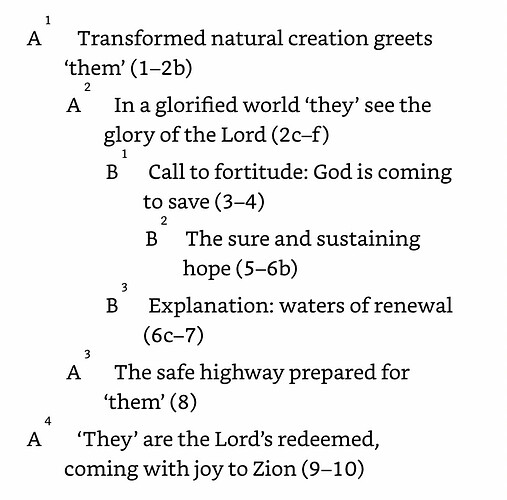Today’s Advent reading is Isaiah 35:1-10. (Click the link to open the passage in a new window).
In The Prophecy of Isaiah, the scholar Alec Motyer argues that these ten verses are a poem, “with the vision of renewed individuals (5–6b) at the centre of its trajectory.” Instead of reading this poetry in a linear, top-to-bottom fashion, we need to approach it with respect for its genre. Without accounting for the structural arrangement of the poem, we are more likely to miss its emphasis and meaning.
In particular, Motyer presents the structure as follows to demonstrate how the poetic form emphasizes the redemption of God’s people in verses 5-6:
Motyer also notes that when God’s redemption is complete, nature is transformed. As the human participants journey through this renewed Creation, their greatest joy is seeing God’s glory.
Clearly, we do not see this hope yet fulfilled. There are still great distortions of nature — great evil — great suffering — and great doubt. Yet Isaiah offers a vivid picture of what will be. And the promise is
Here is your God; vengeance is coming.
God’s retribution is coming; he will save you.”
So how will God save us? We see in verse 9 and 10 that those saved are “the ransomed of the Lord.” Motyer explains,
It speaks here, therefore, of the Lord as the only one who can redeem his people, identifying with them as their next-of-kin, willingly shouldering, on their helpless behalf and in their place, all and every one of their needs, paying their price (Lv. 27:13, 19, 31).
We see in this poem that God brings joy to all of his creation. The physical environment, the animals that dwell within them, and God’s image bearers with all their weaknesses and hurts. We are told that God intends joy — unending joy — for all that he will redeem.
Implicit in Isaiah’s poetic vision is that we feel sorrow because this is not our current reality. We have weak hands. We have shaking knees. We are cowardly. We know the environment is spoiled. Injustice is all around us. So in the present time, our reality is “sorrow and sighing” (verse 10).
But Advent is a time to lift our eyes up. With hope, we look to the fulfillment of God’s promises. And in doing so, we can experience joy.
Personal Reflection and Community Discussion Questions:
-
How does Isaiah’s vision enlarge your understanding of God’s plan of redemption?
-
What might it be like to be “crowned with unending joy” or to have “joy and gladness” overtake us?
You are encouraged to share other reflections on these passages.
You can find this week’s Advent 2021 readings here:

